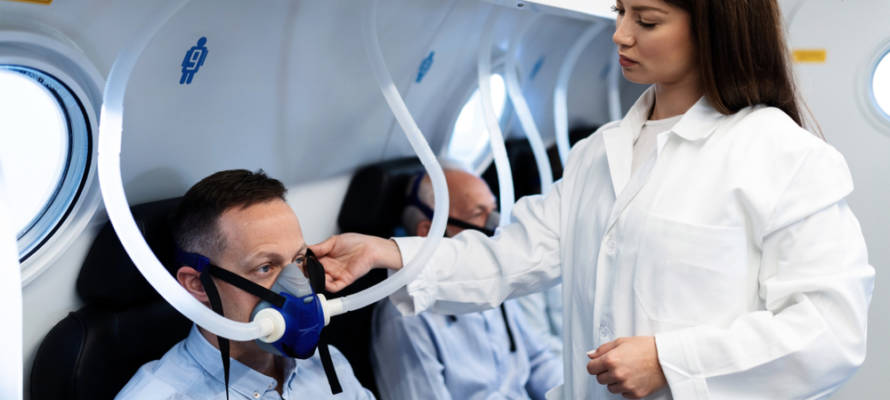‘Our unique therapeutic protocol addresses the biological brain ‘wound’ associated with PTSD,’ explained lead researcher Prof. Shai Efrati.
By Pesach Benson, TPS
Israeli researchers uncovered a promising avenue for treating post-traumatic stress disorder symptoms with Hyperbaric Oxygen Therapy.
Researchers from Tel Aviv University and the Sagol Center for Hyperbaric Medicine and Research at Shamir Medical Center in Beer Yaakov found that hyperbaric oxygen therapy (HBOT) can significantly alleviate PTSD symptoms, particularly for patients unresponsive to traditional therapies such as psychotherapy or psychiatric medications.
Hyperbaric Oxygen Therapy (HBOT) is a medical treatment that involves breathing pure oxygen in a pressurized environment.
This therapy is typically administered in a specialized chamber, where the air pressure is increased to levels higher than normal atmospheric pressure.
The increased pressure allows oxygen to dissolve more efficiently into the blood plasma, reaching areas with reduced blood flow or damaged tissues.
A typical HBOT session lasts between one and two hours.
“Our unique therapeutic protocol addresses the biological brain ‘wound’ associated with PTSD,” explained lead researcher Prof. Shai Efrati, who works at both institutions.
“This treatment reduces hallmark symptoms like flashbacks, hypervigilance, and irritability, offering hope to millions of PTSD sufferers and their families worldwide.”
PTSD is a mental health condition triggered by experiencing or witnessing a terrifying event. Symptoms may include flashbacks, nightmares, severe anxiety, and uncontrollable thoughts about the event.
People with PTSD may avoid situations or things that remind them of the traumatic event, and they may have negative changes in beliefs and feelings.
The research, recently published in the peer-reviewed Journal of Clinical Psychiatry, studied 98 Israeli army veterans diagnosed with combat-related PTSD between 2019-2023.
One group of soldiers received HBOT, while the second group underwent a placebo treatment, breathing normal air under the same conditions.
The results were remarkable. Patients in the HBOT group displayed significant improvements in brain connectivity as shown in functional MRI (fMRI) scans, alongside a notable reduction in PTSD symptoms. Conversely, the placebo group showed no measurable changes.
“Our study demonstrated that HBOT induces biological healing in the brain of PTSD sufferers. Curing the biological wound also impacts clinical symptoms. We believe that HBOT, based on the special protocol we have developed, can bring relief to numerous PTSD sufferers worldwide, allowing them to resume a normative life in their community and family,” Efrait said.
Studies estimate that 3-4% of the global population experiences PTSD at any given time, and about 20% of individuals who experience a traumatic event will develop PTSD.
In regions affected by war or conflict, PTSD rates can soar to 15-20% or higher.
“Before the Hamas attack on Oct. 7, 2023, approximately 6,000 IDF veterans had been recognized as PTSD sufferers, with many others, both soldiers and citizens, not yet acknowledged by the authorities,” Efrati said.
“Following Oct. 7 and the ensuing war, these numbers have risen sharply. Tens of thousands of soldiers, and much larger numbers of civilians, are likely to be diagnosed with PTSD.”
The findings could open the door to enhanced treatment protocols for PTSD patients and its integration into military and veterans’ healthcare systems.
